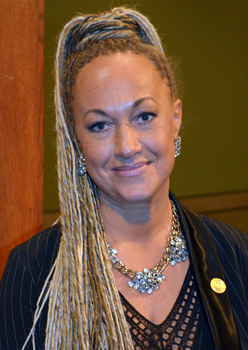An inquiry is being opened at Spokane City Hall, where Dolezal identified herself in application materials as having several ethnic origins, including white, black and American Indian in her application to the Office of Police Ombudsman Commission.
“We are gathering facts to determine if any city policies related to volunteer boards and commissions have been violated,” Mayor David Condon and Council President Ben Stuckart said in a joint statement. “That information will be reviewed by the City Council, which has oversight of city boards and commissions.”
Dolezal was appointed to the oversight board by Condon.
Some people at organizations Dolezal is or has been associated with say they’ve had questions about her representations of herself for some time.
James Wilburn, past president of the Spokane NAACP who was replaced by Dolezal, said Thursday that discussions about her background were relegated to a few members of that group before her election late last year.
“It was discussed among close members to me, and we kept it like that,” Wilburn said.
A former board member of the Kootenai County Task Force on Human Relations said he recently approached other board members, urging them to come forward with concerns about Dolezal’s truthfulness. That assertion is disputed by two current board members.
The Human Rights Education Institute, which employed Dolezal for three years, is the education arm of the task force.
Kurt Neumaier has served as an alternate board member or former full member of the task force since 2001. He said he had suspicions about alleged hate crimes that Dolezal has reported to police in Coeur d’Alene and Spokane, and said he was concerned that the decision of the task force and Human Rights Education Institute to hire her was done without proper vetting and checking into claims about her background. Neumaier said he approached board members recently, urging them to go public with these concerns because of Dolezal’s growing profile in Spokane, but that board members didn’t want to.
Tony Stewart, a co-founder of the task force and longtime civil-rights champion in Coeur d’Alene, said today he does not recall discussing Dolezal at any recent board meeting. Christie Wood, the current head of the task force and spokeswoman for the Coeur d’Alene Police Department, also denied that Neumaier approached the board recently.
“Certainly when things like this happen it’s sad, but what I really deeply believe, and I think history has borne this out, human rights and civil rights is far, far stronger than any one personality or even one organization,” Stewart said.
Also this week, Spokane police files on Dolezal’s report that she received a hate mail package and other mailing in late February and March were released. Police records say the initial package Dolezal reported receiving did not bear a date stamp or bar code – which Dolezal herself told police when she reported it. Investigators interviewed postal workers, who said it was either very unlikely or impossible that the package could have been processed through the post office, and that the only other alternative was that it had been put there by someone with a key.
However, several other pieces of mail sent in the same handwriting and style, and with the writer identifying himself in the same way as “War Pig (Ret.),” have been received by Dolezal, the Spokane Valley Police Department and The Spokesman-Review. Those other letters were date-stamped and postmarked from Oakland, California.
It was not clear from the reports, released through a public records request Wednesday, if the police investigation into the letter has concluded or was ongoing. Dolezal said Wednesday she believes it has reached an end, at least for the time being.
“They’re not going any further. … I didn’t hear the word closed, but I did hear there’s nothing more they can do at this time,” she said.
Dolezal said she received a key to the post office box when she became president of the NAACP earlier this year. Asked about the possibility that she had put the package there herself, she said, “That’s such bullshyt. What mother would terrorize her own children?”
She said she was not questioned about that possibility by police, and was bothered by initial media reports about the package. “Nobody’s ever come out and said (they suspect me) directly, but I am bothered by the subtle implication,” she said.
Neumaier said he was suspicious of several incidents Dolezal reported in Coeur d’Alene, including her discovery of a swastika on the door of the Human Rights Education Institute when the organization’s security camera was “mysteriously turned off.”
“None of them passed the smell test,” he said.
He said that after Dolezal left the institute and he saw her gaining prominence in Spokane – becoming head of the NAACP, chairman of the police ombudsman oversight commission, teaching at Eastern Washington University, and speaking frequently in public on racism and justice issues – that he became worried that there might be “blowback” for the institute for not doing a better job of vetting her.
Part of Neumaier’s job on the board is to look at complaints of human rights violations and help victims take action and seek justice.
“In all of these incidents (she reported in Coeur d’Alene), she was the sole witness to events that, when put under scrutiny, don’t hold up,” he said.
Dolezal has made many reports of harassment and other crimes to police. None have resulted in arrests or charges – but neither have any included direct claims that she fabricated them. In some cases, such as a report that a noose was left on her porch in Spokane, there were other witnesses.
Ruthanne Dolezal said her message to her daughter is simple.
“I would say, ‘I love you, and honesty is the best policy,’” she said. “I firmly believe that the truth is in everyone’s best interest.”













